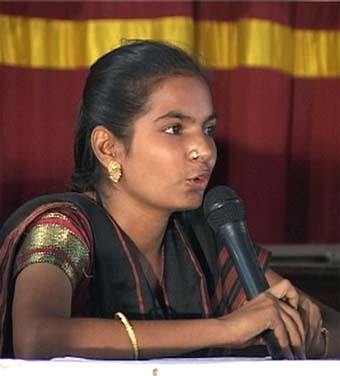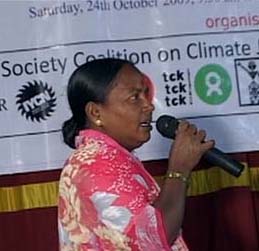Feb 05, 2026
Feb 05, 2026
by Geeta Seshu
 "Do we have cars? Do we clog up the drains with our garbage and our plastic rubbish? Do we build multi-storeyed apartments and throw the debris of our construction material into the storm water drains? Tell me, do we cause pollution?" asked an impassioned Jamila Mote, angry that slum-dwellers and the poor are often unfairly accused of causing pollution, despite being forced to live in crowded shanties, amidst filth and waste.
"Do we have cars? Do we clog up the drains with our garbage and our plastic rubbish? Do we build multi-storeyed apartments and throw the debris of our construction material into the storm water drains? Tell me, do we cause pollution?" asked an impassioned Jamila Mote, angry that slum-dwellers and the poor are often unfairly accused of causing pollution, despite being forced to live in crowded shanties, amidst filth and waste.
Speaking at a unique public hearing on the impact of climate change in urban areas on the occasion of the International Day for Climate Action, Jamila was bitter about the abject lack of facilities for slum-dwellers. In Annabhau Sathe Nagar, the 'basti' (shanty) in Govandi in North-East Mumbai that she resides in, residents have no water, no electricity and no dispensaries. The 'basti' itself is located beside a 60-ft sewer.
Jamila was one of the forceful Voices from Mumbai's Margins (Mee Mumbai Boltay) at the public hearing organised by Oxfam India and a coalition of 15 civil society organisations as part of a series of hearings representing people living in different ecosystems. Walter Mendoza of the Indian Network on Ethics and Climate Change was one of the driving forces behind the coalition that included academic bodies like Tata Institute of Social Sciences (TISS) and Xavier's Institute for Social Research; documentation centres like Centre for Education and Documentation (CED), slum-dwellers organised by NGOs like Yuva and the Indian Youth Climate Network.

"I came to this city as an eight year old girl from Jalnaand. I remember there were so many trees then. Now, everything is concrete" - Supriya Sabale
Already, hearings have been held for people in mountainous regions, semi-arid zones, flood-prone areas, coastal areas and forests. The series will culminate in a meeting in New Delhi from November 11-13, barely weeks before the international summit on climate change in Copenhagen in December and the coalition hopes the voices it brings to the fore will articulate a desire for change.
However, for the over 200 people assembled at the hearing, Copenhagen was far removed from their lives. Not so much climate change, which is a reality for people, who have experienced the vagaries of monsoon and the resultant poor crop yield, the rising sea-levels, reducing catch and drought or flooding.
Lourdes Nunes spoke of her seemingly idyllic existence in Bhayander on the outskirts of Mumbai: "I've seen the changes in rainfall patterns since my childhood. It is now erratic and farmers have lost their crop, thus moving away from agriculture. They have begun using a lot of chemical fertilisers instead of the natural fertilisers and even if they do get a better yield in the short term, the soil hardens and the land becomes infertile. Many of them are becoming frustrated and selling off their lands." Angry at government policy that was more focused on tourism and turning this beautiful area - a coastal and mountainous belt - into a special economic zone (SEZ), Lourdes was also upset that the youth was becoming increasingly alienated from nature.
Another government directive of dumping garbage generated by Mumbai on a hillock in Gorai - despite numerous protests lodged by villagers - is causing a lot of distress. "We are fighting to preserve these areas and have sent at least 5,000 individual letters of protest to the government. The dumping ground is located on top of a mountain and the water seeps into our lands, polluting our groundwater. In the monsoon, all the garbage flows to the bottom. Anyone can see how disastrous this is but the government does not listen," Nunes said bitterly.
"I came to this city as an eight year old girl from Jalnaand. I remember there were so many trees then. Now, everything is concrete," said Supriya Sabale, President of the Parisar Bhagini Vikas Sangh, an organisation of ragpickers that now works towards the segregation of garbage and convertion of wet waste into compost in several building societies in suburban Mumbai. Supriya said that she came from a family of rag pickers and hence had been helping out even as a child. "Then, the garbage we picked up was mostly paper, glass and cloth. We hardly saw plastic," she said, while adding that for rag pickers more garbage was good for business. "But now I realise how it affects our environment, clogs up drains and spreads diseases. We must have strict laws for segregation of wet and dry waste," she said.
The impact of climate change is most keenly felt by the poor, who have no safety nets whatsoever, said other participants at the public hearing. Suresh Gawli, a cobbler, pointed out the irony of cancelling licences for shoemakers and cobblers but giving huge concessions to the leather industry, a known polluter. Hawkers are routinely evicted but the real culprits are given facilities by the administration, he said, adding that society's perceptions of the poor must be drastically reviewed.
That the poor are treated as culprits instead of victims of climate change was the running theme at the hearing. Santosh Thorat, who has worked with housing rights groups in Mankhurd, pointed out that it was these very people who had built the concrete towers of Mumbai, but it was the people who live in them who are chiefly causing the climate crisis by wasting water, installing air-conditioners in every room and maintaining several cars per family.
Neville D'Souza, who has worked with fisher-folk in the Borivli-Gorai belt of North West Mumbai, spoke with nostalgia of the social and cultural changes that had affected his people. "Our koliwadas (fishing villages) still exist. We have our own language and culture. But now when we go out to fish, we get more plastic in our daily catch. Pollution has resulted in many species of fish dying out. Our mangroves are being destroyed before our eyes. We are at the forefront of the struggle against climate change because we are so severely affected by it," he said.
Experts at the hearing were divided on apportioning the blame of climate change: Should the blame rest on Mumbai city, the megalopolis that has grabbed so much of water and power from surrounding areas, or on the elites who have opted for a ecologically unsustainable lifestyle?
Environmentalist Girish Raut was forthright. "Don't look for solutions from Mumbai. It is an illogical city and our fate that it (Mumbai) is still running," he said, pointing out that the rising sea-levels were a dangerous outcome of climate change.
The real villains were private motorised vehicles, believed environmental journalist Darryl D'Monte, who added that the poor only occupied around eight per cent of the land and the majority of them walked to work. Others, like IIT scientist Dr Shyam Asolekar, pointed out that Mumbai's peculiar geography, with at least 15 kilometres below sea-level, meant that flooding was inevitable and the poor were worst affected as they had no resources to secure themselves against such upheavals. T. Jayaraman, of TISS, spoke of the challenges before India at the forthcoming Copenhagen summit. Unravelling the complicated negotiations on reducing carbon emissions, he felt that countries like India, China and Brazil must negotiate non-binding commitments to reduce the rate of growth of emissions. Critical of carbon credits, he felt they only passed on the burden of emissions to other countries. He also argued that there should be no patent rights on new technology so as to engender research and development of any energy technology that was not based on fossil fuels.
The coalition will submit the deliberations of the hearings to governments at the Copenhagen summit in the hope that the voices of the marginalised will be heard by policy-makers. After all, it's the voiceless, who need to be heard now.
08-Nov-2009
More by : Geeta Seshu